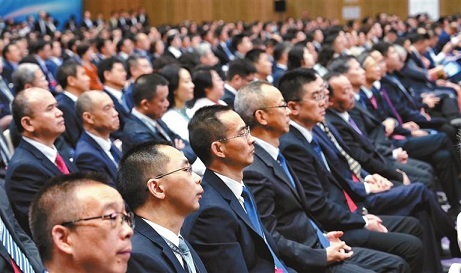Shenzhen
 2024/2/20
2024/2/20
 source: Shenzhen Daily
source: Shenzhen Daily
 Print
Print

Participants listen to speeches at the Guangdong Provincial High-quality Development Conference at the Shenzhen World Exhibition and Convention Center in Bao’an District on Sunday. Lin Jianping
Chen Siqi
vankochensq@163.com
DISCUSSION about the potential of cutting-edge technologies to drive industrial growth and innovation took center stage at a subforum at the Guangdong Provincial High-quality Development Conference held at the Shenzhen World Exhibition & Convention Center in Bao’an District on Sunday.
Government officials, industry insiders, and scientists gathered at the subforum to discuss accelerating construction of a modern industrial system that will promote the convergence of technology and industry.
Gu Huinan, general manager of GAC AION New Energy Vehicles Co. Ltd., recognizes the potential of intelligent vehicles, saying that 2024 will witness rapid developments in L3 intelligent driving. He believes that once commercial trials are approved for L3 or L4 automatic driving, it could lead to a flourishing automatic driving industry.
In the autonomous driving industry, Level 3, also called “conditional” driving automation, refers to an intelligent driving system that is capable of managing most tasks associated with driving, such as environmental monitoring, but human intervention may be required at certain times. Level 4 differs from level 3 in that human intervention is not required under most conditions and is referred to as “high” driving automation.
Gu also highlighted the forthcoming next-generation revolution in electric vehicle batteries — all-solid-state battery technology. Despite Guangdong’s new energy vehicle output reaching 2.53 million units in 2023, Gu believes that disruptive innovations are necessary for the industry to thrive in the face of increasing technological, cost, and ecological competition within the automotive industry.
His view was echoed by Zheng Hairong, vice president of the Shenzhen Institute of Advanced Technology (SIAT), Chinese Academy of Sciences, who called for more efforts to enhance technological innovation, particularly original and disruptive tech innovations. He also stressed that the key to enhancing technological innovation is possessing high-quality human capital.
To this end, SIAT is committed to attracting top global talent, creating new platforms for them to innovate, and transforming their innovations into tangible products.
Zheng suggested that Guangdong Province, and especially Shenzhen, should leverage their advantageous locations in the Guangdong-Hong Kong-Macao Greater Bay Area to take the lead in attracting global talent and creating a supportive environment for scientists.
Sharing insights into the modern industrial system, Wang Cheng, chief operating officer of TCL, a well-known consumer electronics brand, suggested a steadfast focus on tech innovation and independent technology development.
Over the past three years, TCL had invested over 12 billion yuan (US$1.66 billion) in research and development, according to Wang, who proposed using digitalization and AI to drive the transformation of manufacturing.





